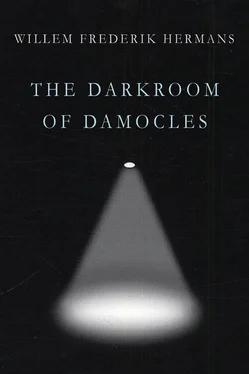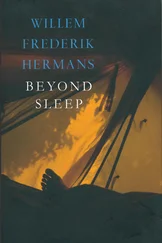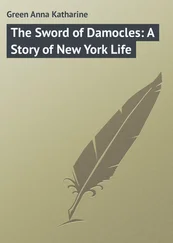Sitting beside Ebernuss in the car to Amsterdam, he couldn’t believe his eyes. It was pitch-dark, and theirs was the only car on the road. It was as if the population had died out during his captivity. Even when they drove into the city he saw nobody in the streets.
‘Is the food shortage that bad?’
‘Food shortage!’ echoed Ebernuss. ‘Our soldiers are going short, too. They don’t get more than five cigarettes a week.’
‘So why aren’t there any people about? It’s still early, after all.’
‘It is not early. It is close to nine o’clock, and by eight everybody has to be off the streets.’
They stopped at a junction, not to look out for other traffic, but because Ebernuss was not sure which direction to take. Now and then a heavy droning sounded in the sky.
‘I don’t see any searchlights,’ said Osewoudt. ‘What’s up with them?’
‘Searchlights aren’t used any more. The latest thing is radar; invisible rays on long wavelengths. But whether those invisible rays allow us to see our enemies is doubtful. We never shoot any down nowadays.’
‘Excellent,’ said Osewoudt, ‘then the war will be over all the sooner.’
‘Quite. The sooner the better. What are your plans for after the war, supposing I get you through it alive?’
‘I’ll join the American intelligence service in Germany.’
‘Very funny. What with our having spent so much time together, I’ve grown rather fond of you, Osewoudt. We must remain friends. When the Americans arrive, let’s not say goodbye for ever. I have no one left in the world, just like you.’
‘So you said.’
‘It strikes me that you never call me by my first name. I would like to hear my name from your lips. No one ever calls me Waldemar now.’
Osewoudt made no reply.
‘What you should have said,’ Ebernuss went on, ‘what you should have said is: you never call me by my first name either. To which I would have replied: I like your first name, but your surname’s better. Besides, I’d rather not use your first name, because I realise there must have been plenty of people close to you calling you Henri. I wouldn’t want to be forward.’
‘It’s over the way,’ Osewoudt said, pointing. ‘The odd numbers are on this side of the canal.’
Ebernuss braked, reversed down Ziezeniskade, then turned to cross the bridge. Slowly they jolted over the potholed Lijnbaansgracht.
‘Did your mother call you Henri?’
‘Yes, my mother called me Henri, but I’d rather not talk about her.’
‘I thought you’d be glad of a chance to talk about your mother. It must be ages since you had an opportunity to talk about her with anyone.’
‘I don’t talk about her, even when there’s an opportunity.’
‘You must have loved her very much. A mother who murders the father — the consummate mother! Why would a woman need a man if she has a son? It’s the same with bees: after inseminating the female, the male dies. I have a confession to make. I went to far greater lengths to save your mother than the Jewish girl. But it was too late. She had already committed suicide in prison. Had I been able to save your mother, I wouldn’t have lifted a finger for the little Jewess. Not even to wring a promise from you, or to make you cooperate.’
Osewoudt leaned forward. They were at the corner of Spiegelgracht. Ebernuss stopped the car and switched on a spotlight. He beamed it on a house number and said: ‘It would have been far better for you if I’d been able to save your mother instead of that girl.’
‘The address is five numbers further on,’ said Osewoudt. ‘May I suggest you park by the entrance?’
Ebernuss laid his hand on Osewoudt’s knee. He looked straight ahead, keeping the spotlight on the house number.
‘You’re not even listening to what I’m saying. Pity. I repeat: we are both alone in the world, and once the war’s over there won’t be a place in it for us. Not for either of us, do you hear? Not for me, but not for you either. I won’t go into details, but remember this: in times to come, you’ll have cause to think of me. If we leave each other in the lurch, neither of us will last long. Suppose the Americans get here next week — they’re a hundred kilometres past the Rhine already, and the Canadians are advancing in the east. It’s April now. I won’t make it to the end of the year. But nor will you. You mark my words, and I don’t need to read any tea leaves to make my prediction: you will have cause to think of me!’
‘Christ, I wish you’d get a move on. What do you want to do with the car? Leave it here?’
Ebernuss switched off the spotlight, put the car in gear and drove up Spiegelgracht. He parked under a tree along the canal and they got out.
It was a small DKW with a sputtering engine which still ran on proper fuel, not on gas or wood. It was black and yellow, and had a Dutch registration number. There was nothing about it to suggest that it belonged to the German police.
Osewoudt stared up at the dark sky while Ebernuss locked the car. The drone of the invisible bombers now grew deaf-eningly loud, like a circular saw of gigantic proportions being drawn across the city.
‘Here, take this,’ said Ebernuss, grasping Osewoudt’s hand. Osewoudt felt the chill of metal against his palm, and lowered his eyes.
‘Your Leica. Put it away, or just hold it in your hand, as you like. There’s a new film in it. If it had been up to me you’d have had your pistol back too. But there you are — not everything is up to me.’
‘What is it you really want?’ asked Osewoudt.
‘I want out, Osewoudt. I wish you’d believe me. I’ve had enough. The war’s over as far as I’m concerned. I regret everything I did for the German intelligence service. You think I have a hold over you, but in reality it’s you who have a hold over me. You’re the ones with power now, not us.’
‘In that case, why don’t you get in your car and drive back to The Hague or wherever you like. Just let me go. Leave me alone. After the war I’ll see what my friends can do for you.’
‘Letting you go wouldn’t be enough. There’s much more I want to make up for. Your case is nothing compared to everything else I have on my conscience.’
‘Fine, but let’s discuss that some other time.’
‘No! No! It has to be now! There’s something very important that you don’t know. Do as I say: introduce me to those people, get them to fix me up with a hideout. You’ll be sorry if you don’t.’
‘Is that a threat?’
‘Why don’t you trust me? Here! Take the car key.’
Osewoudt took the key and pocketed it.
‘Why are you so cagey about taking me inside?’ Ebernuss went on. ‘You can tell them everything you know about me. I mean it! Do you hate me so much that you’d rather see me dead, along with the rest of Hitler’s gang? What have I done to deserve that? I’ve always been decent to you, haven’t I? I did everything I possibly could for you. I had them release your pregnant girlfriend from that camp. I never raised my hand against you.’
Osewoudt said nothing. He cradled the Leica to his chest as if it were a small pet he had just saved from imminent death.
‘It’s not only about me, you know,’ Ebernuss persisted, pinching Osewoudt’s sleeve between thumb and forefinger. ‘Truly Osewoudt, it’s of vital importance to you as well. You’ll understand that later.’
‘If it’s so important, why won’t you tell me now?’
‘What good would that do? It’s not you who needs to know, it’s them . Not you, them. I wish you would believe me, Osewoudt.’
‘I haven’t any cigarettes on me,’ said Osewoudt. ‘Give me another of yours, will you?’
Ebernuss stood still, fumbled in his trouser pocket, and offered Osewoudt a cigarette.
Читать дальше












